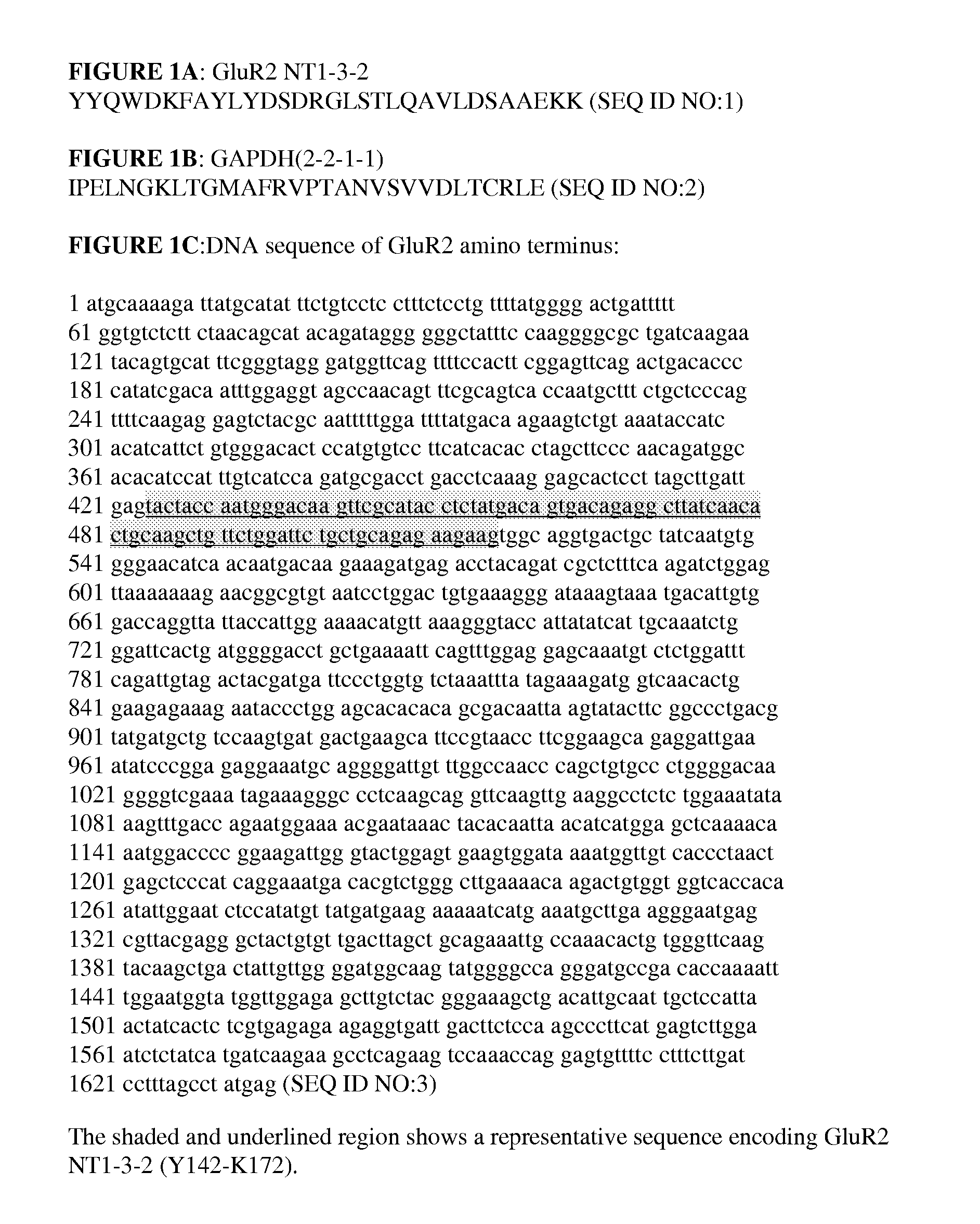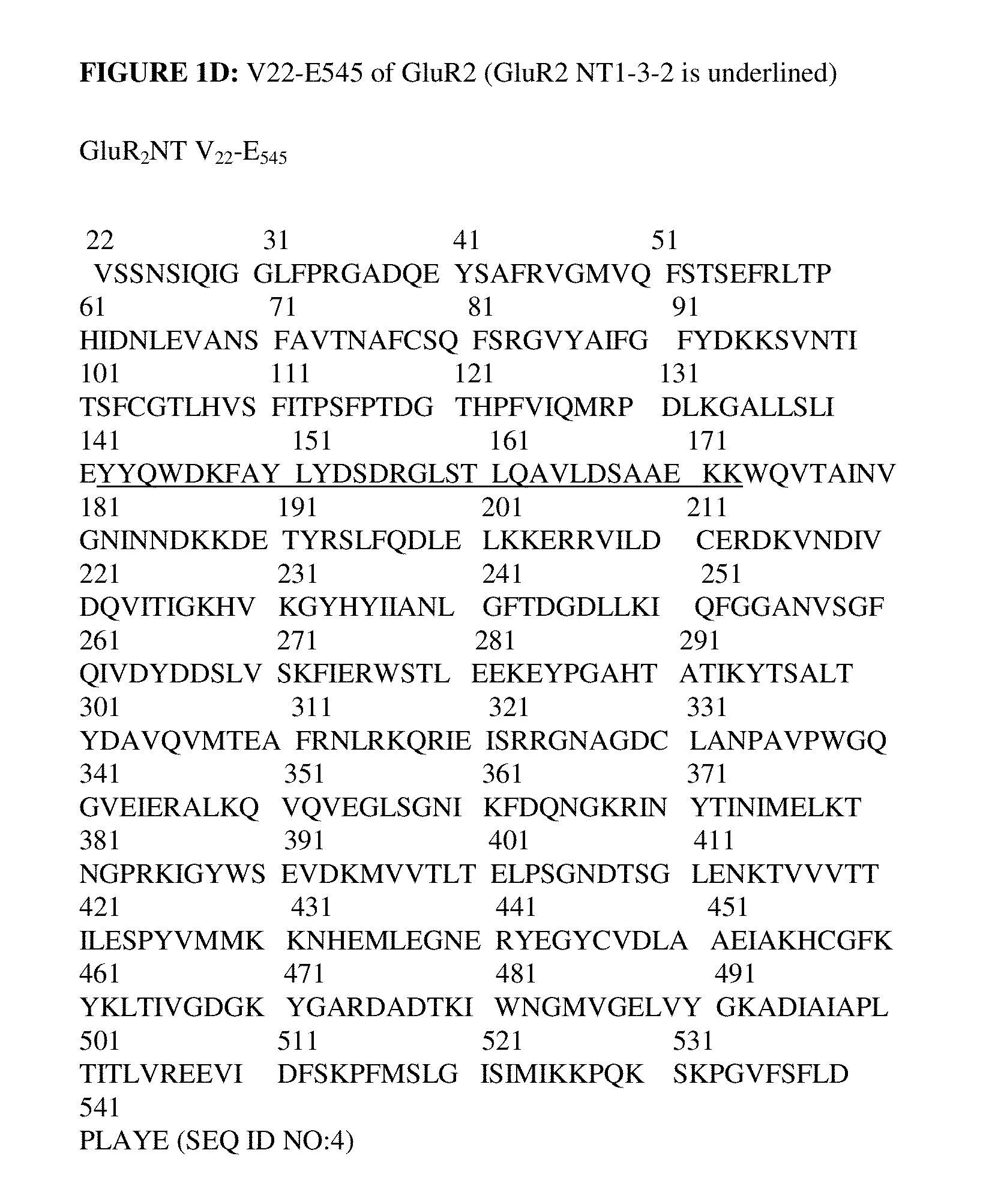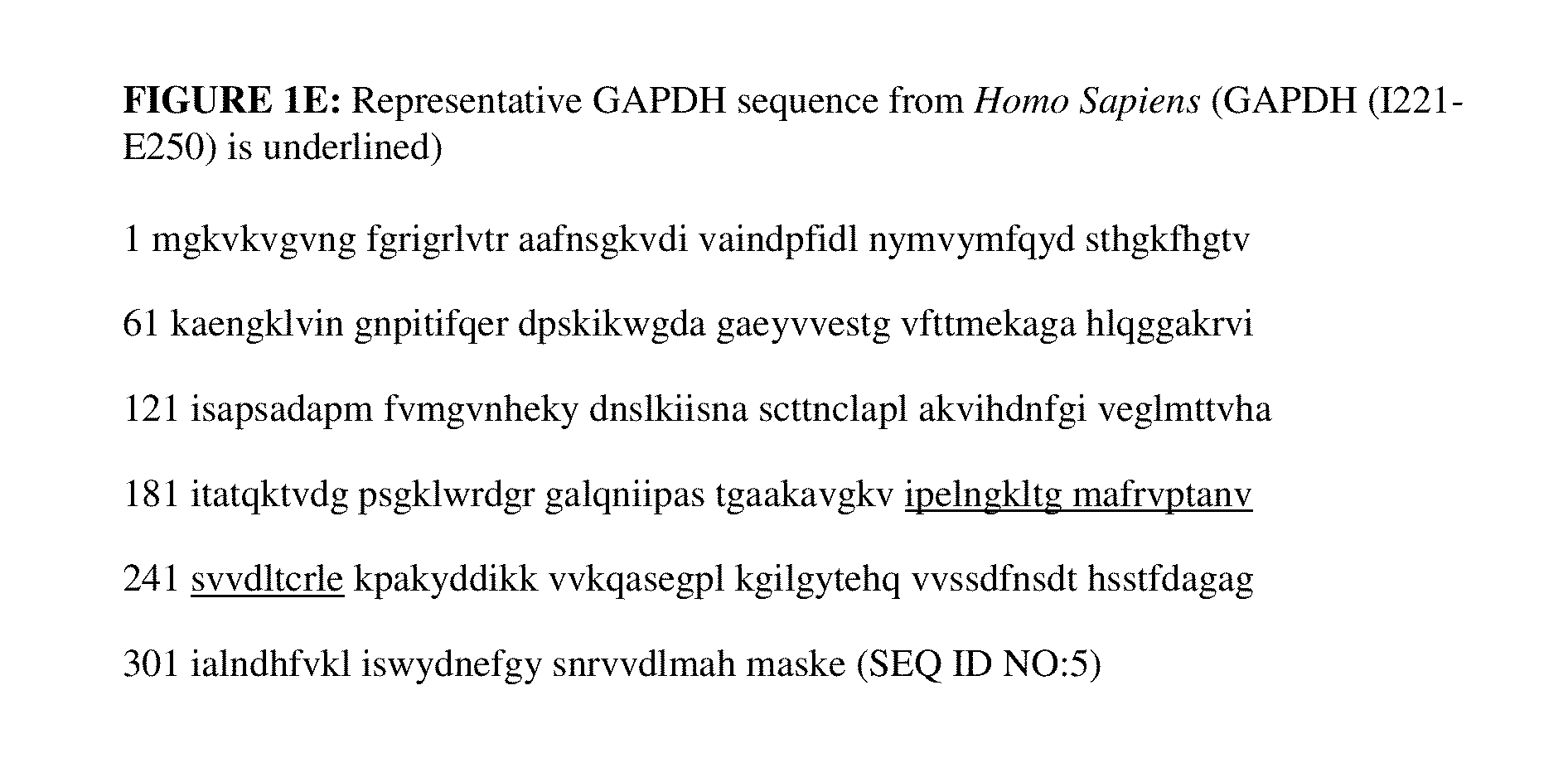Compositions and methods for modulating AMPA receptor-mediated excitotoxicity
a technology of ampa receptor and excitotoxicity, applied in the direction of drug composition, peptide/protein ingredient, metabolic disorder, etc., can solve the problems of not being the sole, the use of nmda antagonists in animal models of ischemia as well as in human clinical trials has not generally shown the anticipated robust efficacy, and the failure of anti-seizure therapy in stroke trials
- Summary
- Abstract
- Description
- Claims
- Application Information
AI Technical Summary
Benefits of technology
Problems solved by technology
Method used
Image
Examples
example 1
GAPDH Interacts with the Amino-Terminus of the GluR2 Subunit
[0136]To identify proteins that might possibly interact with N-terminus (NT) of AMPA receptor GluR1 and GluR2 subunits, we incubated rat hippocampal extracts with GST-fusion proteins: GST-GluR1NT (A19-E538), GST-GluR2NT (V22-E545), and GST alone, respectively. Then samples were subjected onto 10% SDS-PAGE and stained with Coomassie blue 8250. A single immunoreactive band with an apparent molecular mass of ˜37 kDa was enriched in GST-GluR2NT precipitated sample but not in that of GST-GluR1NT or GST alone. We excised the ˜37 kDa band from the gel and used mass spectrometry to identify the protein. The most significant score for this band was obtained with GAPDH (Table 1).
[0137]
TABLE 1Protein Analysis ResultsDatabase: NCBInr (2314886 sequences; 787107140 residues)Taxonomy: Mammalia (mammals) (340771 sequences)PeptideProteinACMassScoreMatchedTaxonomyGlyceraldehyde 3-gi|56188361031283Rattusphosphate-norvegicusdehydrogenaseMatche...
example 2
Identification of Interaction Sites of the GAPDH and the GluR2 Subunit Complex
[0138]In order to delineate the region of the GluR2NT involved in the interaction with the GAPDH, three GluR2NT GST-fusion proteins [GluR2 NTa V22-S271, (250 a.a), GluR2 NTb K272-421, (150 a.a), GluR2 NTc L422-E545, (124 a.a)] were constructed (FIG. 4A). In affinity purification assays, GluR2 NTa, but not GluR2 NTb, GluR2 NTc or GST alone precipitated GAPDH in rat hippocampal brain extract (FIG. 4B). Although these results demonstrated the presence of a GAPDH and GluR2 NT complex, it could not determine whether the complex was formed through a direct or indirect interaction. To clarify the nature of the interaction, blot overlay experiments were performed, which provided in vitro evidence for a direct interaction. GluR2 NTa, GluR2 NTb and GluR2 NTc were probed with in vitro translated [35S]-methionine labelled peptides encoding GAPDH ([35S]-GAPDH). The [35S]-GAPDH probe bound with GluR2 NTa, but not GluR2 ...
example 3
Agonist Regulation of GluR2NT-GAPDH Protein-Protein Interactions
[0144]Before investigating whether the direct protein-protein interaction between GAPDH and GluR2 NT have functional implications, we tested if AMPA receptor activation affected the observed interactions. Based on previous reports, we focused on the GluR1 / GluR2 AMPA receptor combination, one of the two most common AMPA receptor subunit combinations in the hippocampus, which have important defined roles in AMPA receptor trafficking and synaptic plasticity.
[0145]We co-expressed both GluR1 and GluR2 along in the presence or absence of the GluR2 NT1-3-2 mini-gene in HEK293T cells. It should be noted that HEK293T cells expresses endogenous GAPDH. The GluR2 subunit and GAPDH could associate without exogenous AMPA receptor agonist stimulation (FIG. 7). The insertion of mini-gene greatly interrupted the protein-protein interaction.
[0146]Activation of AMPA receptor with the agonist glutamate resulted in an increase in the CO-IP ...
PUM
| Property | Measurement | Unit |
|---|---|---|
| thermal melting point | aaaaa | aaaaa |
| apparent molecular mass | aaaaa | aaaaa |
| resting membrane potentials | aaaaa | aaaaa |
Abstract
Description
Claims
Application Information
 Login to View More
Login to View More - Generate Ideas
- Intellectual Property
- Life Sciences
- Materials
- Tech Scout
- Unparalleled Data Quality
- Higher Quality Content
- 60% Fewer Hallucinations
Browse by: Latest US Patents, China's latest patents, Technical Efficacy Thesaurus, Application Domain, Technology Topic, Popular Technical Reports.
© 2025 PatSnap. All rights reserved.Legal|Privacy policy|Modern Slavery Act Transparency Statement|Sitemap|About US| Contact US: help@patsnap.com



